Over 100 Journalists Detained In Iran In Last Year
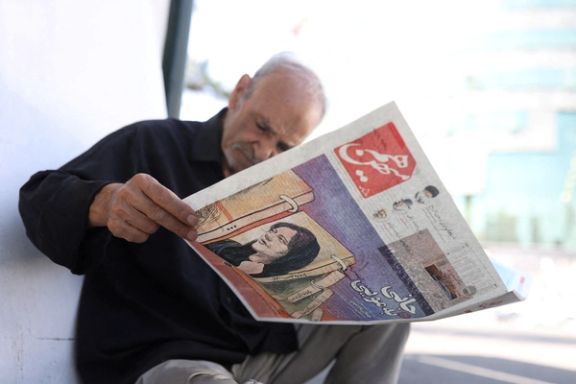
The International Federation of Journalists (IFJ) claims at least 100 journalists have been arrested and imprisoned in Iran in the past year.

The International Federation of Journalists (IFJ) claims at least 100 journalists have been arrested and imprisoned in Iran in the past year.
Many of these journalists have received long sentences or were even forced to leave their jobs. Additionally, at least eight media outlets have faced restrictions due to pressure from security institutions or government and more than 20 journalists have been sentenced to prison on charges such as propaganda against the regime and acting against the country's security.
The issue of summoning whereby journalists are being ordered by judicial authorities or security forces to come for interrogations has increased dramatically in the last year, with over 110 journalists being summoned, the report claims.
At least 20 journalists have been exiled due to arrests, summons, and long-term prison sentences. To date, six journalists are still being held unfairly in prison, including Niloofar Hamedi, a journalist at Shargh newspaper, who was arrested at her home in Tehran after reporting the death of Mahsa Amini, whose death sparked the last year of protests rocking the regime.
The 20th World Press Freedom Index by Reporters Without Borders (RSF) put Iran at the rock bottom of the list earlier this year, only better than Eritrea and North Korea.
Iran ranked 178th out of 180 countries in the table, which is four places worse compared with the previous report published in 2021. In the 2022 index, even Turkmenistan, Myanmar and China rank better than the Islamic Republic.
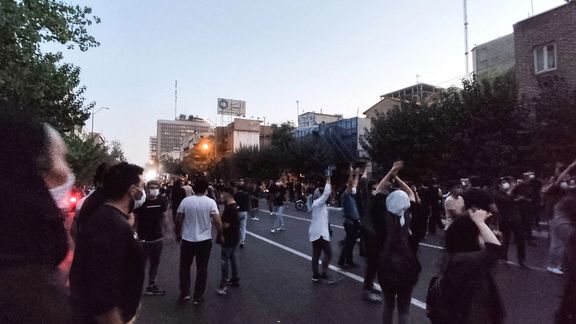
An alliance of underground youth groups, formed during last year’s protests in Iran says it has not only endured but also expanded its efforts aimed at toppling the regime.
Speaking to Iran International, a representative of the United Youth of Iran (UYI) revealed that despite the government's repressive tactics, including widespread arrests and significant communication challenges, they have successfully broadened their efforts. Extending their outreach, they have gone beyond the alliance's initial scope, to connect with a diverse range of groups that were active during the protests. This includes workers' associations, activists, women's and student groups, as well as civil society organizations.
“This was one of our most important achievements,” the representative who requested anonymity said about UYI.
The alliance of youth groups says it fights alongside other Iranians to free the country from its repressive regime.
UYI was formed when several so-called ‘neighborhood youth groups’ found each other on social media and published a manifesto in early December, less than three months after the death of Mahsa Amini in the custody of morality police sparked several-month-long protests across Iran.
The manifesto circulated on social media said it was meant to “pave the grounds for dialogue and cooperation” among various trade organizations, unions, political groups and activists inside Iran and abroad. It has been revised several times since then.
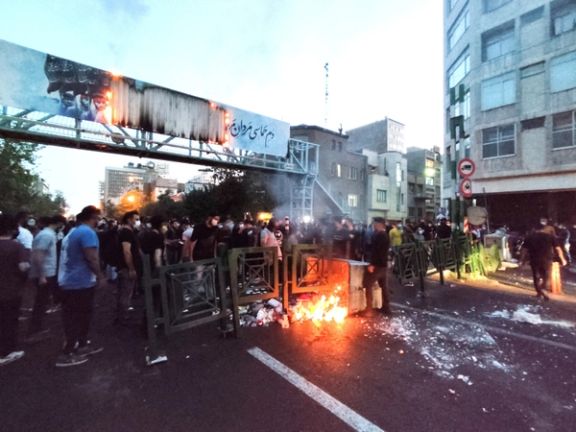
The document said getting rid of the Islamic Republic, separation of religion and state, and the “formation of an inclusive, democratic government” formed the cornerstone of the manifesto.
“Obviously, the regime makes every effort to identify and arrest members of youth groups and clamps down on these groups to prevent them from growing. They also use tactics such as spreading rumors about our connection with dubious political groups,” the representative of UYI told Iran International.
According to her, youth groups from twenty-three cities out of the thirty-five that initially joined the alliance have persevered and remain actively engaged on the ground, consistently prepared for protests. Meanwhile, some have been forced to operate covertly due to security concerns, while others have been compromised following the arrest of their members.
“We contact each other through safe online applications such as Session and Signal but many underground activists are very weary of any contact. Some of them also have difficulty accessing the internet,” one of the leaders of the alliance who also requested anonymity told Iran International.
“The Revolutionary Guard has gained access to social media accounts of some of the original neighborhood youth groups and is controlling their accounts,” he said.
“Last year, even before Mahsa was killed, you could easily feel people’s anger on the streets, the anger coming from loss of hope in the improvement of their lives, … There was an air of darkness and misery,” Behzad, a twenty-one-year-old student of philosophy from Karaj and a member of UYI told Iran International.
According to Behzad and several other members of youth groups, Mahsa’s death sparked the protests, but it was not only vengeance that drove them to the streets to protest. People were fed up with the regime and wanted it gone, they said.
“The Islamic Republic has been dead for a long time. It has lost its legitimacy amongst the people. I’m certain that its annihilation is going to be expedited by the constant attrition among its loyal forces … People will return to the streets again, when the time comes, because we really don’t have anything to lose,” Behzad said.
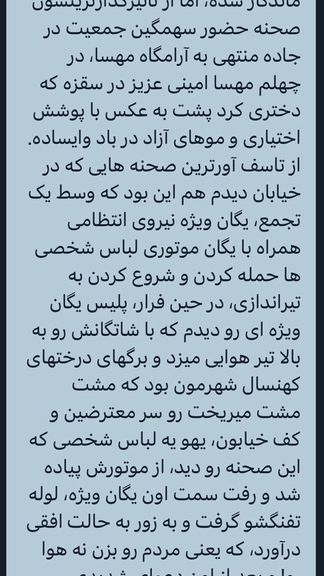
“Mahsa’s killing, another example of the clerical regime’s suppression, increased people’s anger to the extent that it became explosive,” Haleh, 29, who studies arts in Esfahan (Isfahan) said.
"I joined protesters on the streets for the first time in January 2017 when the recent protest movement emerged. It was at that moment that protests in Iran transformed into a revolutionary movement due to the economic and political despair among the people," she added.
Sina, a 25-year-old studying for a master's degree in accounting in Tehran, expressed that the only conceivable future for himself and individuals in a similar situation is emigration or a transformation in the country's governance, as the current circumstances are unsustainable.
“There was this shared pain, the pain that most of the population felt … The drop in the election turnout [in 2020 and 2021] was indicative of the loss of hope in any improvement through the ballot box,” Sina said.
Arezou (27) from Nowshahr in northern Iran who holds a degree in literature also said the future looked dark and miserable to her before last year’s protests. “My country would still be sitting on the verge of an abyss even if I found a way to a bright future for myself … From economy to the environment, from politics to the society’s ethics, everything was quickly falling into decay.”
Last year’s protests spread to many large and small cities across the country, and even to some very conservative towns and villages, despite heavy-handed government crackdowns and recurring internet blackouts but gradually subsided by early 2023, when the regime took even a harsher approach and hanged two young protesters, Mohsen Shekari and Majidreza Rahnavard, in public and five others in the following months.
Around 500 were killed by security forces, tens of thousands of protesters were arrested, thousands were wounded, and hundreds lost their eyes to pellets fired directly at them by security forces during the Mahsa protests.
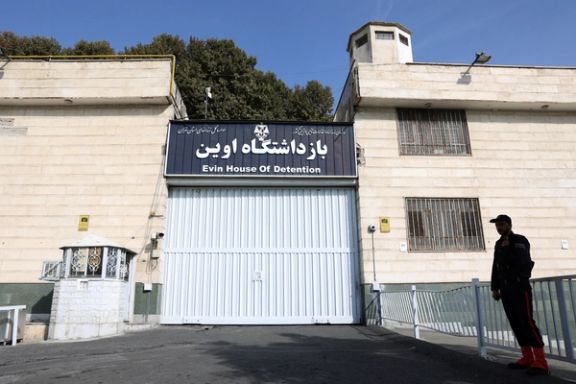
On the first anniversary of the death of Mahsa Amini, detainees in the women's ward of Tehran's Evin Prison gathered in protest.
Chanting slogans of dissent against the regime, the inmates took a stand by refusing to enter their cells and set fire to their headscarves in the prison courtyard.
Seven political prisoners, namely Azadeh Abedini, Sepideh Gholian, Shakila Manafzadeh, Golrokh Iraee, Narges Mohammadi, Mahboubeh Rezaei, and Vida Rabbani, jointly declared their intent to hold a sit-in within the prison courtyard.
Their motivation, they proclaimed, was to "support the people and protest against the regime." This symbolic gesture served as a poignant denunciation of what they termed the "tyranny of the religious authoritarian regime," with the protest occurring on the day when Mahsa Amini lost her life under the pretext of compulsory hijab.
In a statement conveyed via Narges Mohammadi's Instagram page on Friday, the group called upon the people of Iran and the global community to amplify the voices of dissent and opposition, emphasizing the importance of standing united against injustice.
In a demonstration of solidarity with the ongoing protests, a number of other political detainees embarked on a hunger strike. Ali Younesi, Mostafa Tajzadeh, Saeed Madani, Hossein Razzagh, Mehdi Mahmoudian, and Mohammad Najafi issued a letter from Evin Prison, announcing their decision to initiate a hunger strike on Saturday.
In the days preceding the anniversary of Mahsa Amini's death, numerous calls for a nationwide strike and demonstrations, both within Iran and across international cities, have gained momentum.
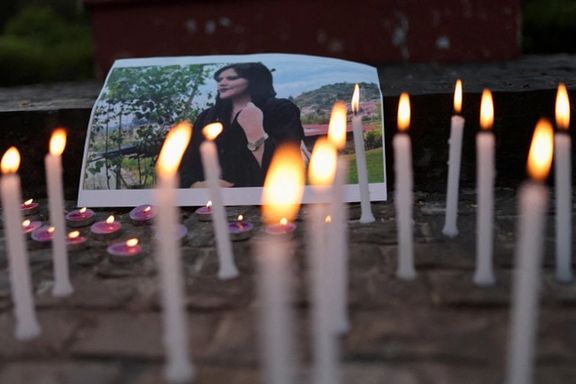
Security is tense in Iran in anticipation of protests on the anniversary of Mahsa Amini's death, with her parents under house arrest and the regime diverting water from a nearby dam to block access to her hometown's cemetery.
Amjad Amini, Mahsa's father, was briefly detained on Saturday and subsequently placed under house arrest with his wife. This occurred amid a heavy security presence around their home in the Kurdish-majority city of Saqqez in western Iran.
According to online footage, city authorities have opened the gates of the Cheraghveis dam, located about 17 kilometers southwest of Saqqez. This diversion allows water from the dam's reservoir to flow through a river, effectively blocking access roads to the Ayyachi Cemetery, where Mahsa is buried. Mahsa, a 22-year-old Iranian-Kurdish woman, died in hijab police custody last year, sparking Iran's largest anti-regime protests. Security forces had already sealed off the main entrance to the cemetery on Friday.
On the eve of Mahsa's first death anniversary, people chanted slogans from their windows in Tehran and many other cities across the country. However, planned street protests for the day have been scarce due to the heavy presence of security forces.
Social media has been inundated with images and reports depicting an unprecedented security presence in Kurdish provinces and major cities, including Tehran, Karaj, Rasht, and Tabriz.
Grassroots activists in Tehran informed Iran International on Saturday that the city's main squares are crowded with military and an assortment of security forces, including many plainclothes agents. Military riot control vehicles are stationed every 10 meters in some locations, with black vans positioned to contain potential detainees in between. Some neighborhoods in the capital, with limited access to main streets, such as Ekbatan, have been completely cordoned off by vehicles as security forces patrol the area continuously.
Checkpoint inspections have been established at the entrances to all Kurdish-populated cities, resulting in significant traffic congestion and thorough searches of both passengers and vehicles.
Calls for action by foreign-based activists continue, with numerous Iranian expatriates holding gatherings in several European cities, including Brussels and Paris. Rallies were held in Australia, New Zealand, and Japan earlier in the day.
However, state media claim Amini's hometown of Saqqez was "completely quiet" and that calls for strikes and protests in Kurdish areas had failed due to "the presence of security and military forces".
IRNA quoted an official in the Kordestan province as saying, "A number of agents affiliated with counter-revolutionary groups who had planned to create chaos and prepare media fodder were arrested in the early hours of this morning."
In the protests that followed Amini's death more than 500 people, including 71 minors, were killed, hundreds injured and thousands arrested, rights groups said. Iran carried out seven executions linked to the unrest.
Iran International covered events on Mahsa Amini's death anniversary on September 16. Below are videos and developments in Iran and abroad.
----------------------------------------------------------------------------------------------------------------------------------------------------------------
People in the central city of Arak are out on streets in defiance of regime’s security measures.
----------------------------------------------------------------------------------------------------------------------------------------------------------------
With nightfall across Iran, the number of protesters is increasing on streets. In this video from the northern city of Rasht, people are chanting “death to dictator,” referring to the Supreme Leader.
----------------------------------------------------------------------------------------------------------------------------------------------------------------
While the internet is disrupted across the country, videos of Saturday’s protests are being published in the evening. In this video from earlier in the day, security forces are seen attacking people near Enghelab (revolution) square in Tehran.
----------------------------------------------------------------------------------------------------------------------------------------------------------------
Anti-riot police on motorcycles armed with clubs and shotguns swarm the streets of Ekbatan district in Tehran. Person who posted the video says that one would think they have come to war against armed guerillas, but they have come to attack ordinary citizens.
----------------------------------------------------------------------------------------------------------------------------------------------------------------
People singing traditional Kurdish songs at Mahsa Zhina Amini's grave near her hometown Saqqes.
----------------------------------------------------------------------------------------------------------------------------------------------------------------
Video from earlier in the day in Mashhad shows clashes as a man is heard claiming that protesters are beating security forces as heavy congestion prevents backup forces to reach the square.
----------------------------------------------------------------------------------------------------------------------------------------------------------------
Iranian expatriates in several Italian cities, including Rome, Milan and Bologna held rallies on the occasion of the death anniversary of Mahsa Amini.
----------------------------------------------------------------------------------------------------------------------------------------------------------------
----------------------------------------------------------------------------------------------------------------------------------------------------------------
----------------------------------------------------------------------------------------------------------------------------------------------------------------
----------------------------------------------------------------------------------------------------------------------------------------------------------------
People in the city of Karaj, near the capital Tehran, are chanting "We are a great nation; we will reclaim Iran."
----------------------------------------------------------------------------------------------------------------------------------------------------------------
Security forces are using fire department vehicles for crowd control in the city of Langarud in northern Gilan province.
----------------------------------------------------------------------------------------------------------------------------------------------------------------
People in the city of Mashhad, known for its religious significance, are out on streets rallying in support of the Women, Life, Freedom protests while others express support with long honks from their cars.
----------------------------------------------------------------------------------------------------------------------------------------------------------------
Iranians living in Sweden also marched in the streets of Malmo as they chanted the main slogans of the protests in Iran.
----------------------------------------------------------------------------------------------------------------------------------------------------------------
To prevent movement of people between Kurdish-majority cities, security forces have blocked the road from the city of Baneh to Saqqez, the hometown of Mahsa Amini, where security is intense in anticipation of large gatherings.
----------------------------------------------------------------------------------------------------------------------------------------------------------------
----------------------------------------------------------------------------------------------------------------------------------------------------------------
Security forces are quick to attack to disperse people as they gather together to form groups. This video shows regime agents clashing with several people in front of the University of Tehran.
----------------------------------------------------------------------------------------------------------------------------------------------------------------
In addition to a rally, the Iranian diaspora community in Australia held an event about the uprising in Iran where several Australian officials such as lawmaker Keith Wolahan delivered speeches about the prospects of a revolution in Iran.
----------------------------------------------------------------------------------------------------------------------------------------------------------------
Iranian expatriates in several German cities such as Heidelberg and Frankfurt have held rallies in support of the Women, Life, Freedom movement, chanting slogans against the Islamic regime and its ruler Ali Khamenei.
----------------------------------------------------------------------------------------------------------------------------------------------------------------
City authorities in the French capital Paris renamed a park to Jardin Villemin Mahsa Jina Amini during a ceremony attended by Iranian expatriates and Paris mayor, Anne Hidalgo, on the death anniversary of the main icon of Iran’s Women, Life, Freedom movement.
----------------------------------------------------------------------------------------------------------------------------------------------------------------
Iranian diaspora community in the German city of Hanover held a gathering to commemorate the death of Mahsa Amini at the hands of the Islamic Republic’s morality police and express solidarity with the Women, Life, Freedom movement.
----------------------------------------------------------------------------------------------------------------------------------------------------------------
Security agents have already attacked people in Tehran's Revolution Street midday Saturday, beating and arresting passersby.
----------------------------------------------------------------------------------------------------------------------------------------------------------------
Iranians in Denmark holding a rally on Saturday to mark the first anniversary of anti-regime protests.
-----------------------------------------------------------------------------------------------------------------------------------------------------------------
Many journalists, lawyers, activists, students, academics, artists, public figures and members of ethnic minorities accused of links with the protest wave, as well as relatives of protesters killed in the unrest, have been arrested, summoned, threatened or fired from jobs in the past few weeks, according to Iranian and Western human rights groups.
-----------------------------------------------------------------------------------------------------------------------------------------------------------------
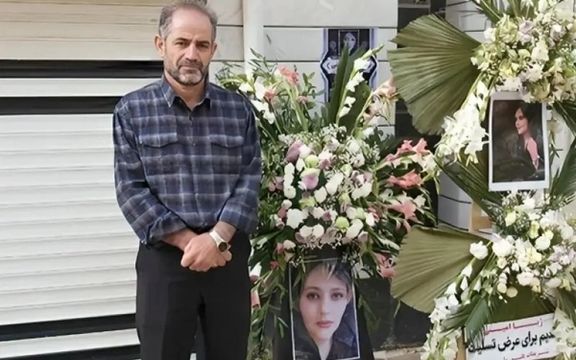
On the first anniversary of his daughter's death, the father of Mahsa Amini was briefly arrested, the latest in a line of arrests over recent weeks.
Amjad Amini was apprehended by IRGC agents shortly after leaving his home on Saturday and taken to an undisclosed location before he was released and put under house arrest later in the day.
"Security forces detained Amjad Amini today and returned him to his house after threatening him against marking his daughter's death anniversary," A Kurdish human rights group said.
Mahsa Amini's mother's residence is currently surrounded, resembling a military compound, and security measures have been significantly increased in Kurdish-populated regions.
Her uncle has also in recent weeks been arrested with multiple threats levied to her brother as the family is subjected to constant pressure not to gather in remembrance of her death in morality police custody hands one year ago.
Social media has been inundated with images and reports depicting an unprecedented security presence in Kurdish provinces and major cities, including Tehran, Karaj, Rasht, and Tabriz. The Kurdish human rights networks have indicated that Iranian security forces are preventing non-local individuals from entering Mahsa's hometown, including her cemetery.
Checkpoint inspections have been established at the entrances to all Kurdish-populated cities, resulting in significant traffic congestion and thorough searches of both passengers and vehicles.
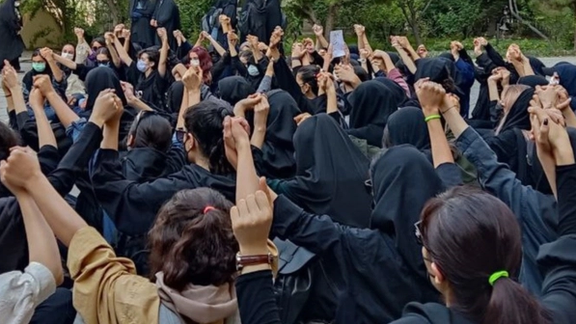
Students from four universities in Tehran have released statements in support of the Women, Life, Freedom protests and to mark the anniversary of Mahsa Amini's death.
In the statements, students from Science and Technology University, Amir Kabir, Beheshti and Khajeh Nasir Toosi Universities underlined that the women's rights protests signify a "public outpouring of frustration against the Islamic Republic."
Students have been at the forefront of protests since the death in morality police custody of 22-year-old Mahsa Amini, with many students arrested and barred from continuing their studies for speaking out against the regime and refusing to wear mandatory hijab on campus.
Students at the Beheshti University reaffirmed their unwavering commitment to the cause, emphasizing their resolute support for resistance despite witnessing violence and hostility.
Students from Science and Technology University recalled the events of the past year when "innocent blood was shed, and our patience was tested," leading to a unified call for justice for Mahsa whose killers have still not been brought to justice. The regime claims she died of a pre-existing condition, but scans revealed she had suffered fatal blows to the head.
AmirKabir University of Technology students explicitly stated their opposition to various forces undermining freedom, such as “the Supreme Leader, the IRGC, paramilitary organizations, monarchy, the Mujahedin-e Khalq, centralization, and any form of tyranny or totalitarianism.”
Meanwhile, students from Khajeh Nasir Toosi University of Technology voiced their support, declaring their challenge to the system.






